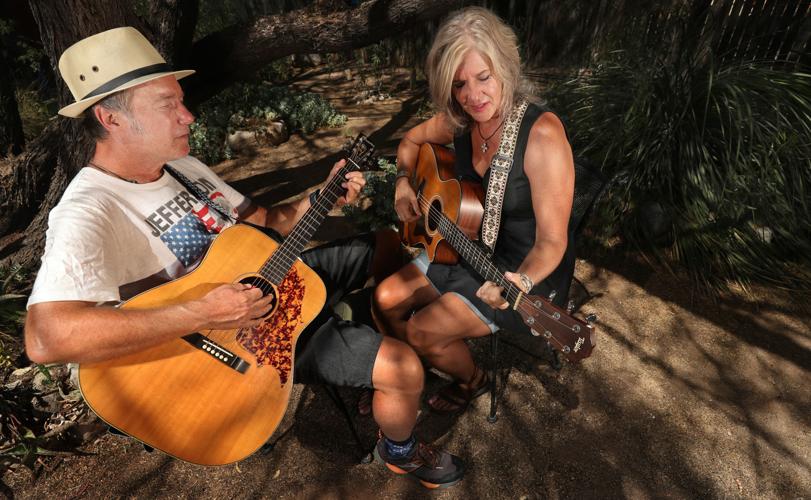Rich Hopkins is celebrating 30 years as a full-time musician in Tucson.
If he was a company man, he’d be getting a gold watch and an “attaboy” from the boss as he strolls into retirement.
But musicians don’t retire.
They put out another record.
Hopkins and his Luminarios band are celebrating his latest album, “Back to the Garden,” with a CD release gig at Club Congress, one of Hopkins’s regular haunts over a career that started when he was in his mid-20s.
Music was never supposed to be a plan. Hopkins didn’t grow up with music, never studied an instrument and never played in a band when he was a teen. From the third grade through high school, he attended boarding schools, including the long-closed Treehaven School on Tucson’s east side. The first time he picked up a guitar was a couple years after he earned a degree in anthropology from Ithaca College in New York when he did a two-year stint in the Peace Corps in Paraguay in the early 1980s.
“And that’s where it all really started happening for me, where I was thinking, ‘Wow I really love this’,” the 61-year-old Texas native recalled recently. “Even when I came back in 1983 to Tucson, I thought, wow I will never be in a band. It wasn’t even on my mind. I was thinking I should get a job … but I really wanted to play music. It wouldn’t go away.”
Hopkins enrolled in graduate school at the University of Arizona and married Andrea Curtis, who played drums in the Tucson band Phantom Limbs. He took on jobs that were a world away from his studies including environmental research at a UA lab, transporting kids for a day care center, working the night shift at KAJR/KJOY radio station and selling liquor in a Walgreens store.
In 1984, the father of one joined a garage band that played a few gigs in an old club near KXCI’s studio.
“I didn’t even own a guitar or amplifier,” he said. “I had written some music and they liked my songs so we sang them.”
The band’s lineup kept turning over so he left and started laying the groundwork to form his own band.
That band, the Sidewinders, went on to become one of Tucson’s most successful 1980s rock bands.
The Sidewinders was inspired by Tucson bands Giant Sand and Red.
“We really weren’t very good,” Hopkins confessed. “Like a lot of bands starting off, we had to learn how to play, we had to learn how to write songs.”
Hopkins’s wife played drums the first couple years until the couple divorced, and the band also included Tucson musicians Bruce Halper and Mark Perrodin. They met their lead singer, David Slutes, at a house party in Slutes’ home, which included his four-track Sitting Duck Studios. Slutes offered to let the band record a track and Hopkins recalled that they had laid down drums, bass, lead guitar and rhythm guitar. When they came back a week later to hear the song, Slutes had added lyrics and a vocal track.
“I thought I was going to listen to the basic tracks, no vocals,” Hopkins said. “But it sounded like a match made in heaven.”
“It’s really about timing and meeting certain people at certain times and just jumping on it,” he added.
Slutes joined the band, which later signed a major label record deal. The Sidewinders released two albums on RCA imprint Mammoth Records — their debut “Witchdoctor” in 1989 and “Auntie Ramos’ Pool Hall” in 1990.
Just as they were building momentum on a national level, the band hit a brick wall courtesy of a North Carolina cover band also called the Sidewinders. That band sued over the use of the name, and after winding through legal proceedings for two years, Tucson’s Sidewinders changed their name to Sand Rubies.
“That really knocked the wind out of us,” Hopkins said. “All of a sudden things just weren’t the same anymore. We were not the little garage band out of Tucson.”
As the Sand Rubies, Hokpins’ and company, which by now were starting to feel some internal struggle within their ranks, signed on to Chrysalis/Atlas records. They released one album on the label in 1993 but before the year was out, the band dissolved.
Hopkins, meanwhile, formed the desert rock outfit Rich Hopkins and the Luminarios — he put his name on it to avoid any chance of someone claiming he was infringing on their name — as a side project in the early 1990s. When the Sand Rubies folded, he turned his full focus on the band as its principal songwriter and lead singer. Luminarios features his wife Lisa Novak who plays guitar and sings backup, and a rotating cast of musicians including Jon Sanchez and Damon Barnaby on guitar; drummers George Duron and Alan Anderson; and bass players Duane Hollis and Ken Andree.
“Back to the Garden” is album No. 20 or 21 of his career.
“I’ve lost count,” said Hopkins, a prolific songwriter who mines his life and world around him for songwriting inspiration.
Novak is a big part of his inspiration and a constant collaborator. She plays an even bigger role on “Garden,” singing lead and harmony on several songs. The album returns Hopkins to his early garage band days, with jam-worthy guitar solos that make way for softer, adult contemporary reflections, as if Hopkins is showing the maturity of his place in life.
“It just seems like I’m making better music now than I ever did,” said Hopkins, who owns Hurricane Records on North Fourth Avenue. “I don’t want to compare what I did with the Sidewinders with what I do know. It’s different now.”
As for that gold watch and strolling off into the sunset of retirement?
“Crossed my mind, but music has been such a big part of my life,” he said. “Not there yet.”





